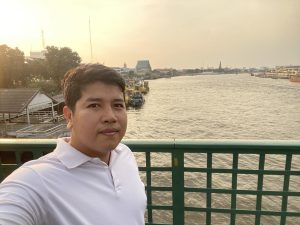Human rights groups have condemned the Thai government’s arrest of three Cambodian political activists ahead of Prime Minister Hun Manet’s first visit to the country later this week.
On Friday, Radio Free Asia reported the arrest of Kung Raiya, a government critic who has spent two spells in prison over the past decade, opposition activist Phan Phana, and Lim Sokha, a senior member of the opposition Candlelight Party. According to another report, the three were detained by immigration police at their homes in Bangkok and Rayong.
The three activists had recently fled to Thailand to seek asylum and had been designated persons of concern by UNHCR, the United Nations refugee agency. The trio were detained along with their families, including four small children aged between 1 and 5 years, Emilie Palamy Pradichit of the Manushya Foundation in Bangkok told Voice of America.
The trio said that they had planned to hold a public protest on Wednesday, the day Hun Manet is scheduled to arrive in Thailand on his first state visit since taking office last August.
“I am afraid that I will be deported back to Cambodia,” Phan Phana told RFA Khmer after his arrest, accusing the ruling Cambodian People’s Party (CPP) of being behind his arrest.
In an emailed statement over the weekend, Phil Robertson of the advocacy group Human Rights Watch (HRW) said that the case was the latest example of the Thai government acquiescing in the transnational repression of neighboring states.
“Rounding up U.N. recognized refugees to please Cambodian Prime Minister Hun Manet ahead of his visit to Bangkok next week is hardly the best way for Thailand to persuade the international community it deserves a seat on the U.N. Human Rights Council,” Robertson said in the statement. “Thailand should not cooperate with his expanding transnational repression efforts.”
Added Yin Mengly of the Cambodian human rights group ADHOC, “The Thai government can’t deport those activists based only on their politics or freedom of expression.”
All three activists have a recent history of opposing the CPP. Lem Sokha, 45, is the vice president of the Cambodian Refugee Committee and had been living in Thailand since fleeing there in 2017. The 41-year-old Phan Phana is a former member of the banned Cambodia National Rescue Party who fled to Thailand in 2022, and now runs three Facebook groups critical of the Cambodian government. In August, he was attacked by three Khmer-speaking men in Rayong, suffering injuries to his face and chest.
Kung Raiya, 32, has spent two periods in prison for publicly criticizing the government. In 2015, Raiya, then a 25-year-old student, was arrested over a Facebook post calling for a “color revolution” to oust the CPP, and later sentenced to 18 months in prison. Two years later, he was again arrested, this time for printing T-shirts with the image of the late opposition political activist Kem Ley, who was gunned down in a petrol station in Phnom Penh in 2016. In June of last year, Raiya quit the Candlelight Party and briefly joined the CPP before reneging on his decision and fleeing to Bangkok the following month.
The arrest of the three is part of a worrying evolution of the Thai government’s attitudes. For more than a century, Thailand has served as a sanctuary for political exiles from across Southeast Asia, including Ho Chi Minh, Chin Peng of the Malayan Communist Party, and Prince Souphanouvong of Laos, as well as tens of thousands of exiles from neighboring Myanmar. (The country has also generated the reverse phenomenon, with domestic repression scattering Thai exiles across the globe.)
The country has become a particularly important safe haven for Cambodian opposition members over the past decade, as the CPP has clamped down hard on any and all forms of opposition. But the Thai government, which could once be expected to turn a blind eye to the presence of Cambodian nationals, provided they kept their heads down, has become more active in arresting and sending them back across the border. Thai authorities have arrested and deported dozens of Cambodian dissident refugees in recent years, some of whom have faced arrest and mistreatment on arrival.
Last month, Thai immigration police arrested 10 Cambodian nations during a civic workshop in Bangkok, organized by none other than Lem Sokha. This came after Heang Kimsroeun, the head of a pro-CPP micro-party called the Khmer Unity Great Nation Party, called on Prime Minister Srettha Thavisin’s government to investigate the opposition Move Forward Party (MFP), which it accused of offering support to anti-government activists from Cambodia and allowing them to use Thailand “as a safe haven for their propaganda against the government.” (The MFP later denied the claim).
Last week’s arrests are the latest sign that the governments of mainland Southeast Asia have entered into a sort of informal mutual agreement that dissidents should not be permitted to use neighboring countries as safe havens. With the possibility of such sanctuary become more remote, more and more of the region’s critics have been forced into a narrower choice: political acquiescence or prison.

































